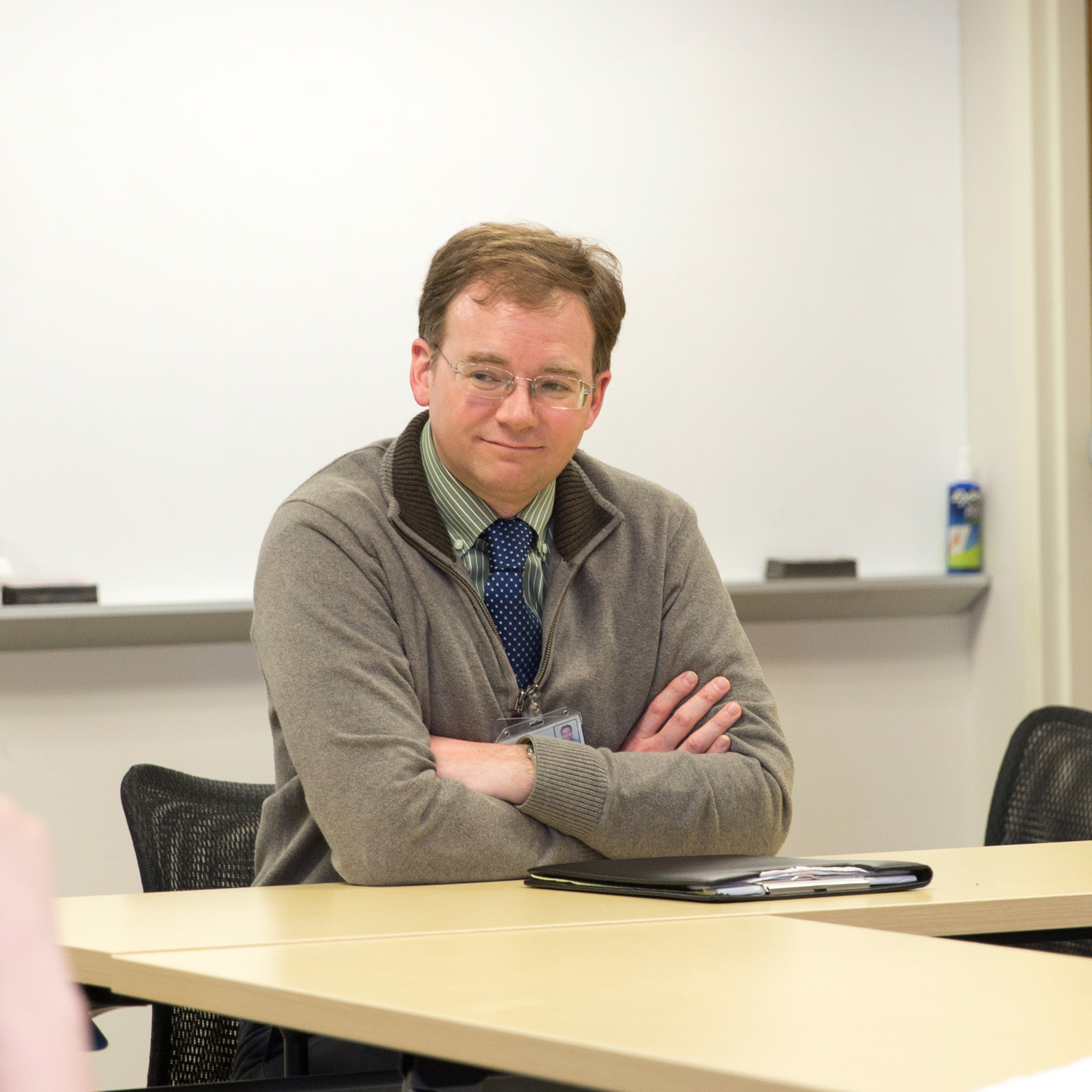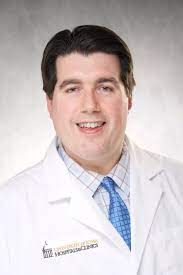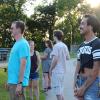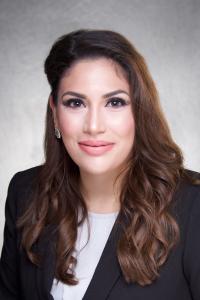Psychiatry Residency
About the Program
The Department of Psychiatry at the University of Iowa is steeped in a rich history of achievement in residency training, clinical practice, and research. The department is thought to be the first university-affiliated psychiatric department west of the Mississippi River.
The four-year psychiatry training program provides each resident with the opportunity to be exposed to and excel in a diverse clinical population. Built on a neurobiological foundation, our program emphasizes the importance of patient care and treatment through an evidence-based approach, providing quality care to each patient in addition to providing each resident with knowledge of current psychiatric practices.
As a psychiatry resident at University of Iowa Health Care, you will gain in-depth clinical experience in outpatient and inpatient settings from experts in the field. You will get a well-rounded experience which will include working on units specializing in:
- Mood disorders
- Psychotic disorders
- Medical psychiatry
- Child psychiatry
- Veteran psychiatry
Residents work in an array of outpatient settings, some of which include:
- Adult psychiatry
- Child psychiatry
- Assertive community treatment (IMPACT)
- Addiction Medicine/MAT Clinic
Residents can also choose from a wide range of elective rotations.
The University of Iowa also has residencies in Family Medicine-Psychiatry, and Internal Medicine-Psychiatry. We are one of two institutions in the country with both a family medicine-psychiatry and an internal medicine-psychiatry residency program, and we also have an inpatient medical psychiatric unit. There are fellowship opportunities in a large number of sub-specialties.
Our training ultimately provides residents with knowledge and first-hand experience managing an array of DSM-5 diagnoses including anxiety disorders, mood disorders, personality disorders, psychotic disorders, and substance use disorders. The education at University of Iowa Health Care is second to none.
Why Iowa?
University of Iowa Health Care
Initially founded in 1898, the University of Iowa Health Care Medical Center is the state of Iowa's only comprehensive academic medical center. With over 800 beds, 200 specialties, and nearly 1800 physicians, UI Health Care Medical Center serves as a vital resource to the people of Iowa and those across the nation. Working closely with the Carver College of Medicine, UI Health Care Medical Center serves to support innovative research efforts, while also training the nation's next generation of physicians in both primary and specialty care.
In 2020, US News and World Report ranked UI Health Care Medical Center the Number 1 hospital in the state of Iowa. Additionally, Forbes has ranked UI Health Care Medical Center as one of 2020's best employers for women.
The University of Iowa Stead Family Children's Hospital is Iowa's only nationally ranked children's hospital. Opened in 2017, the hospital serves as a center for comprehensive pediatric care and research, and is also home to a heartwarming college football tradition known as the "Iowa Wave".
Graduate medical education at Iowa provides training in 29 residencies and 84 fellowships, and is home to nearly 800 trainees every year.
Iowa City
Iowa City is a small college town with a large variety of opportunities! We are located in eastern Iowa, two hours from the capitol, Des Moines, and four hours from both Chicago and Minneapolis. The University of Iowa is the oldest institution of higher education in the state, and is regularly ranked among the top public universities in the country, drawing a diverse group of faculty, staff and students from around the US and the world.
Iowa City is crazy for college sports, and proud home of the UI Hawkeyes, but we are also North America’s oldest UNESCO City of Literature, host to a world-famous writer’s workshop and a vibrant community art scene. We have numerous nearby state parks for year-round outdoor recreation, and our downtown district is home to some of the oldest museums this side of the Mississippi River. We also have great restaurants, an extensive park and trail system, and host numerous large community festivals throughout the year. If you love it, you can find it here!
Coming with a partner? Our primary industries are healthcare and education, but we have a number of opportunities in manufacturing, defense and other specialty industries as well. The university maintains an office dedicated to helping employees’ partners find jobs in their preferred area of work. Check out Dual Career Services for more details.
Coming here with kids?
We enjoy a low cost of living and a wide array of family-friendly activities, including frequent summer festivals and numerous nearby state parks for outdoor recreation year-round. There are a number of affordable daycares near the main hospital campus and the area public schools are excellent. The residency program and the larger hospital take pride in being a family-friendly training environment.
- To learn more about what Iowa City has to offer, check out the Visitor's Guide.
- To find out more about what residents love about living here, visit our FAQ page.
Quick Facts
By the Numbers
- 9 residents are accepted each year
- 36 positions are approved for our program
- 80+ faculty members train and mentor our residents
Benefits
- Competitive stipends
- A comprehensive benefits package:
- Medical, Dental, Hospitalization, and Pharmacy coverage
- Life and Disability coverage
- Malpractice coverage
- 21 days of annual vacation
- 5 additional personal days
- 5 educational days (board exams, conferences, etc)
- Yearly allowance for educational expenses
Program Accreditation
The Psychiatry Residency Program at University of Iowa Health Care Medical Center is accredited by the Accreditation Council for Graduate Medical Education. Our four-year training program leads to board certification eligibility in psychiatry.
Frequently Asked Questions
Where is Iowa City?
Iowa City is 220 miles directly west of Chicago on Interstate 80. It's also within a 4-5 hour drive to Milwaukee, Madison, Minneapolis, Omaha, Kansas City, and St. Louis. It has the cultural, educational, social, and political opportunities of a bigger city with the values and ambiance of a midwestern town. It is clean, safe, nothing is farther than a 15 minute car ride, it has a great city bus system (with bike racks!), wonderful parks, sports, schools, and even sailing. Those who have lived here and left, frequently return because what they were looking for was in their own back yard. But we're not the only ones who think Iowa City is great.
How diverse is your patient population?
We have a surprisingly large international community here, drawn both from the university students and staff and from refugee resettlement programs in the local area. Iowa City itself is 80% white and primarily English speaking, but it’s also quite common to hear Spanish, French, Swahili, and Lingala whether you’re out around town on a weekend or working in the clinic. We also have several small Amish and Mennonite communities in the area. The university works hard to recruit and retain a diverse group of residents and faculty and is regularly named to US News & World Report’s list of top employers for diversity, as well as its list of top employers for women.
What is there to do in Iowa City when you're not working?
There are 15 different festivals and art fairs, plus concerts and race events. There are many music venues, sports events and neighborhood street fairs and garden walks. We also have a really big mall and several smaller ones, 41 parks, nine golf courses, six public tennis courts, six public pools, some lakes and a reservoir with trails, camping, and boating. There are bike trails, some famous bookstores, a ton of galleries, and excellent museums. There are half a dozen or more performing arts venues including Hancher Auditorium. There is always something going on. Find more information from the Iowa City/Coralville Convention and Visitors Bureau.
What's Iowa City like for kids and families?
There's ice skating, bowling, organized sports, 50 public parks, miniature golf, a great public library, a toy library, fun centers, swimming pools and three beaches, nine museums including a children's museum, dance companies, and public recreation centers that feature many activities for kids and families at little or no cost. We also have 20 movie screens and 50 licensed daycare providers. The Iowa City schools are perennially ranked among the top schools in the nation. Iowa City is unique in the facilities and services available for individuals with disabilities. Many families who have a family member with a disability are reluctant to leave Iowa City because they cannot duplicate those services in another location.
Are there any job opportunities for my spouse/significant other?
Yes! The major industries in our area are healthcare, education, manufacturing, and defense, but many jobs in other fields are also available. The university maintains an office dedicated to helping partners of new hires find work in the area. See the University’s Dual Career Services page for more information on this service.
What are the fellowship opportunities available?
We currently offer fellowship opportunities in child and adolescent psychiatry, consult-liaison psychiatry, addiction medicine, palliative care and pain management, among others.
Is this a family friendly program?
Yes, the residency is supportive of residents in their efforts to balance work with family life. We have several physician residents with young families and understand the stresses associated with attempting to find a balance. Women residents receive up to six weeks of paid maternity leave after delivery. Men get five working days off for paternity leave. The house staff health insurance policy provides generous coverage options for spouses and children. There are several childcare facilities near the hospital and one on-site. The training program also has frequent group activities, many of which are kid-friendly, including pumpkin carving, the local NAMI walk, and an annual Halloween party.
Is there sufficient patient volume so that I can have multiple exposures to a variety of diseases?
With 2,200 annual inpatient admissions and 31,000 clinic visits, our residents have the opportunity to see plenty of patients with the most common psychiatric presentations as well as the most complicated. Our inpatient units include specialized areas for adults with mood disorders, psychotic disorders, and substance disorders. There are also specialized units for children and older adults. Residents see patients in various outpatient clinics, including the university Adult Psychiatry Clinic, Child and Adolescent Psychiatry Clinic, Women’s Wellness and Counseling Service, Huntington’s Disease Clinic, VA clinic, and the Abbe Center for Community Mental Health. Our department also receives and manages referrals for specialized services such as ECT and TMS.
What's the call schedule like?
As a resident in our program, you will not be on call more than every fourth night. Junior residents (first- and second-years) are on call about four times per month. Senior residents (third- and fourth-years) are on call two times per month. First- and second-year residents take call in-house with the senior resident available from home as backup. Two junior residents work together during the evenings and on weekend day shifts, and one resident is in-house overnight. We operate a night float system, meaning no one takes 24 hour in-house call.
Do you have a research project requirement for graduation?
All residents are required to fulfill the ACGME requirement of completing a scholarly activity or QI project during training. We have no additional formal requirement for research, but there are many options to pursue additional research if that is your interest.
What's Iowa got that other programs don't?
- A large catchment area and a wide array of specialized units and services, including geriatric unit, medicine psychiatry unit, electroconvulsive service, women’s wellness clinic, chemical dependency clinic, VA clinic, and Huntington’s disease clinic
- A collaborative environment with opportunities to work with departments across the institution
- A highly intellectual community with premier arts events that are accessible to residents in terms of cost and location
- An outstanding school system for children in grades K-12
- A great training program and a high quality of life at an affordable price
First and Second Year
During the first two years of education, residents receive training in psychiatry, medicine, and neurology. These experiences occur both in the inpatient and outpatient settings.
First Year
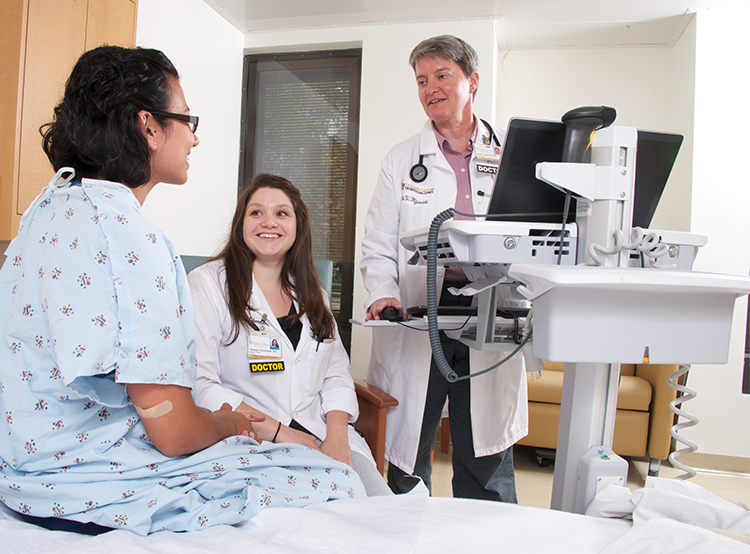 Psychiatry
Psychiatry
Approximately half of the first year is spent training on the inpatient psychiatry units. This occurs at both the University of Iowa Health Care Medical Center and the Iowa City VA Medical Center.
At UI Health Care Medical Center, the adult psychiatry units are organized by primary diagnosis: mood disorders, psychotic disorders, and geriatric psychiatry. We also have an inpatient child psychiatry unit with dedicated pediatric inpatient eating disorder beds. UIHC’s Crisis Stabilization Unit and work on-call provides residents with experience in the emergency psychiatry setting.
With a total of 86 adult psychiatric beds, 15 pediatric psychiatry beds, 15 medicine-psychiatry beds and 12 crisis stabilization beds, the University of Iowa provides residents with a diverse array of inpatient experiences. We also benefit from the use of large multidisciplinary treatment teams on all units, so residents will learn how to collaborate with social work, occupational therapy, dieticians, pharmacists, families, and others in the care of complex psychiatric patients.
Neurology
Residents will spend one month on the inpatient neurology service. They spend an additional month in the outpatient neurology clinic. When rotating on neurology, residents are supervised by senior neurology residents and staff with an attending neurologist.
The University of Iowa provides many additional opportunities to gain exposure to neurology, via participation in ongoing research or clinical electives in the Huntington’s Disease Clinic or the neuropsychology clinic.
Internal Medicine-Psychiatry
The University of Iowa boasts one of the nation’s 16 combined internal medicine-psychiatry residency programs, and is one of the few such programs with its own inpatient medicine-psychiatry unit. Patients on this unit meet inpatient admission criteria for both medical and psychiatric illness, and this unit is where psychiatry interns will complete their required two months of inpatient medicine. This is a great place to learn about the medical sequelae of psychiatric complications such as NMS or complex overdoses. The unit is typically staffed by attending physicians who are board-certified in both specialties, or by a team of two attending physicians (one psychiatrist and one internal medicine physician).
Primary Care Clinic
An additional two months of the first year are spent training in outpatient medicine. Residents may choose between internal medicine, family medicine, and pediatrics. Residents who opt to participate in the rural medicine track will spend their primary care months at a rural family medicine clinic in Washington County, Iowa.
Second Year
Rotations through the general adult inpatient units continue in second year, and residents also begin their exposure to the psychiatric sub-specialties, including child and adolescent psychiatry, addiction medicine, and interventional psychiatry. Additionally, residents begin their outpatient experience with one half-day per week in the university psychiatry clinic, where they will provide medication management and can opt to begin providing psychotherapy as well if desired.
Interventional Psychiatry
The interventional psychiatry rotation provides residents with exposure to procedures such as ECT, TMS, esketamine, and deep brain stimulation.
Addiction Medicine
Residents will spend one month in a variety of settings which focus on addiction medicine. These include the Coralville VA’s dual diagnosis clinic and UIHC’s medication assisted treatment (MAT) clinic, as well as the university’s dual diagnosis and substance abuse partial hospitalization programs. Residents will gain experience in the treatment of substance use disorders along with comorbid psychiatric diagnoses.
Child and Adolescent Psychiatry
During two months of the second year, residents receive training in child and adolescent psychiatry in a combination of inpatient and outpatient settings. The University of Iowa Health Care Medical Center is home to a 15-bed child psychiatry unit and a large child psychiatry outpatient clinic. Additionally, residents who wish to pursue a career in child and adolescent psychiatric can continue their training in the Child and Adolescent Psychiatry Residency.
Consult-Liaison Service
Residents complete at least one month of training on the consult-liaison service, which is staffed by a psychiatry attending and led by the consult fellow. Residents will evaluate a wide variety of psychiatric disturbances that among the medically ill. They will additionally gain experience consulting and collaborating with non-psychiatric colleagues. Residents return to the consult-liaison team as seniors to deepen their exposure to this area.
Third Year
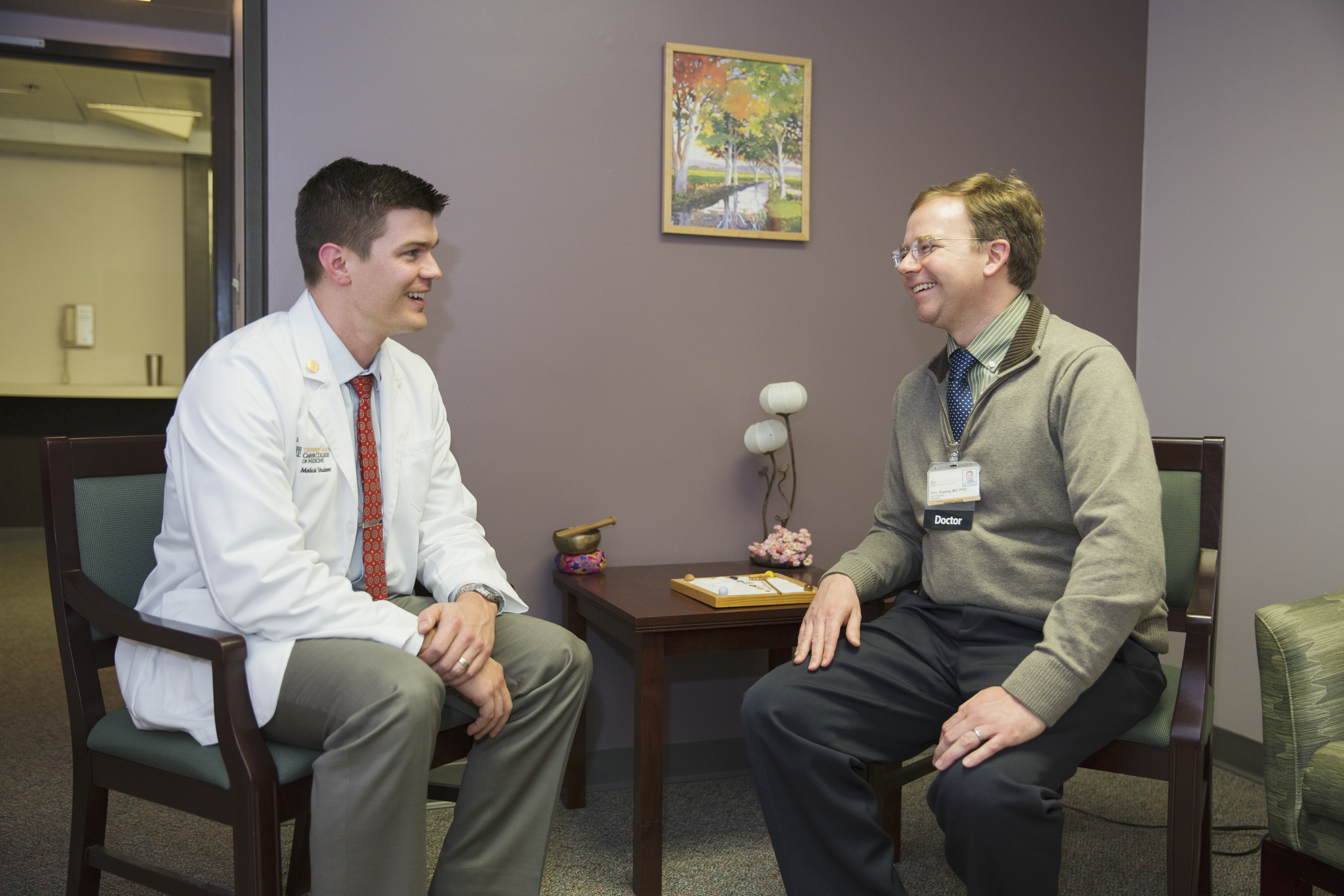 The majority of a resident's third year is split between the adult psychiatry clinics at University of Iowa and the Veterans Affairs outpatient clinic, with an additional elective longitudinal component at the Abbe Center, a local community mental health center, for residents with interest in community psychiatry. All residents participate in both medication management and supervised psychotherapy during this year of their training.
The majority of a resident's third year is split between the adult psychiatry clinics at University of Iowa and the Veterans Affairs outpatient clinic, with an additional elective longitudinal component at the Abbe Center, a local community mental health center, for residents with interest in community psychiatry. All residents participate in both medication management and supervised psychotherapy during this year of their training.
Residents also have opportunities for elective continuity clinics in a wide range of specialty areas, including medication assisted treatment, community psychiatry (based in the local homeless shelter), women’s wellness, and crisis stabilization. Those who are interested in deepening their psychotherapy experience can choose to work with one of our group therapy offerings, including STEPPS (developed here at Iowa!) or DBT.
At University of Iowa Health Care Medical Center, residents see patients with a variety of illnesses – depression, anxiety, bipolar disorder, schizophrenia, attention deficit hyperactivity disorder, personality disorders, substance use disorders, eating disorders, adjustment disorders, etc. Appointments are generally 90 minutes in length for a diagnostic evaluation and 45 minutes for follow-up medication management. This gives residents time to take a thorough, independent history while also allowing time for staffing and education.
After seeing the patient independently, residents will staff with an attending physician in a dedicated conference room, and then both the resident and the attending physician return to the patient’s room to finish the visit. Residents also have at least one half-day of clinic reserved to see patients for psychotherapy.
At the Veterans Affairs clinic, return appointments are 30 minutes. An attending physician is always in-house and cases must be discussed before leaving for the day, but residents may conduct and conclude the appointment independently if they feel comfortable doing so, providing an opportunity for increased autonomy.
Fourth Year
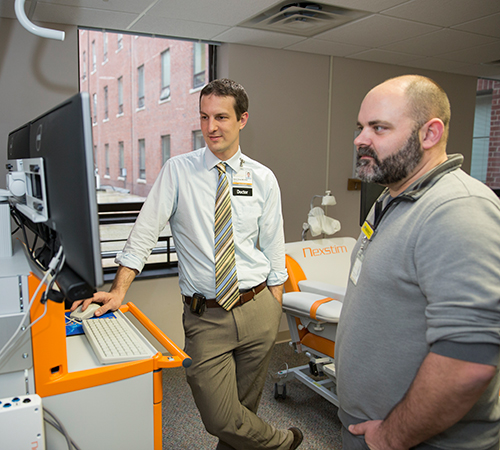 During the fourth year, residents are able to further pursue their own specialized interests. 11 blocks of the year are dedicated for electives where the resident can organize their schedule to include a variety of educational experiences. A resident may choose to repeat past rotations for more in-depth learning, as listed under the first three years. Designing one's own electives is also supported. Options might include work in pharmacology, psychotherapy, community psychiatry, forensic psychiatry, and/or research. One may opt to rotate in settings such as a prison, the partial hospitalization program, a homeless shelter, a drug treatment facility, or the Center for Disabilities and Development. These are only some examples, a resident need only demonstrate that an experience be educational and coordinate with the appropriate people.
During the fourth year, residents are able to further pursue their own specialized interests. 11 blocks of the year are dedicated for electives where the resident can organize their schedule to include a variety of educational experiences. A resident may choose to repeat past rotations for more in-depth learning, as listed under the first three years. Designing one's own electives is also supported. Options might include work in pharmacology, psychotherapy, community psychiatry, forensic psychiatry, and/or research. One may opt to rotate in settings such as a prison, the partial hospitalization program, a homeless shelter, a drug treatment facility, or the Center for Disabilities and Development. These are only some examples, a resident need only demonstrate that an experience be educational and coordinate with the appropriate people.
The other two blocks of the year, the fourth year resident will function as a senior resident on one of the inpatient psychiatry units or the consult service. The resident will have more of a leadership role and will be responsible for supervising junior residents and medical students. There will also be significant opportunities to teach junior residents and medical students. Fourth year residents on the inpatient units usually carry one to two patients on their own and are not expected to round on the inpatient units on holidays and weekends.
For a half-day each week, the resident is allowed to continue treating a sample of his or her patients from the year prior in a continuity clinic. Residents are given greater autonomy with patients during the fourth year, and the continuity of care can be truly rewarding. Two hours each week of psychotherapy patients are also required during the fourth year and are often included in half-day a week of continuity clinic. The fourth year resident also continues to learn by attending didactic sessions and providing support on back-up call about twice per block.
Call
Junior Call
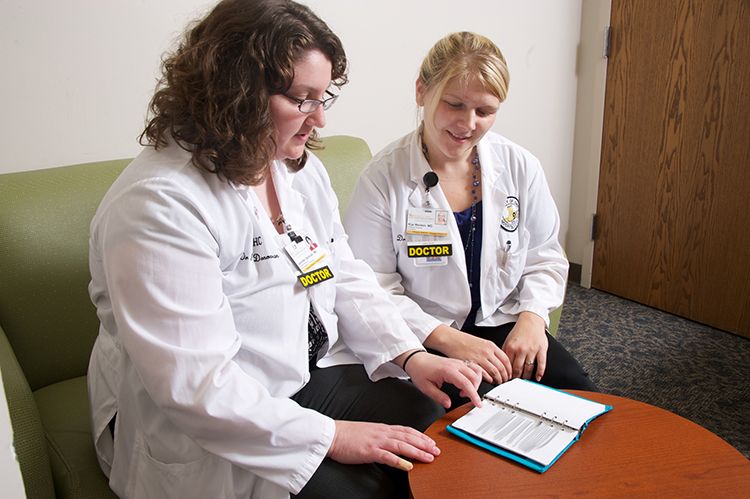
As a PGY-1 and PGY-2, the junior residents take in-house call. For the first four call shifts, the PGY-1 residents are on-call with an in-house senior resident taking “training call.” A PGY-2 is also in-house to assist during training.
After the completion of training call, two junior residents are in-house from 5 p.m. to 10 p.m. on Monday through Friday (“short call”) and from 8 a.m. to 8 p.m. on Saturday and Sunday (“long call” or “day call”). Additionally, a junior resident takes call from Saturday at 8 p.m. to Sunday at 8 a.m.
The other six nights of the week are covered by a dedicated PGY-2 night float resident. Call coverage is limited to the University of Iowa, and junior residents take an average of four call shifts per four week block.
Night Float
A PGY-2 will spend one four-week block on night float. The night float resident works 8 p.m. to 8 a.m. on Sunday night and 9 p.m. to 8 a.m. Monday through Friday night.
Senior Call
The PGY-3 and PGY-4 residents take home call, serving as a back-up to the junior residents. During senior call, the senior resident is available by telephone or pager if juniors need support during their call shift. Most often, this involves staffing consults or patients to be discharged from the emergency room. The senior resident will listen to the case, ask pertinent questions, and help develop an appropriate management plan. On rare occasions, the senior resident is called into the hospital; examples include high patient census, junior resident illness, or a very complicated case. On average, senior call occurs twice per block.
Didactics and Conferences
|
|
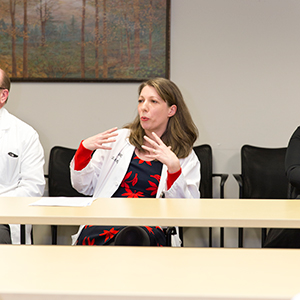 |
Didactics for All Psychiatry Residents
Grand Rounds
- Who: Residents and faculty
- Attendance: Required
Description: Distinguished visitors or departmental faculty members present interesting and challenging patients or discuss topics of special interest. Most grand rounds include a case presentation, typically with a live interview. Relevant literature, including the natural history and current treatment of the disorder, is presented, reviewed, and discussed.
Journal Club
- Who: Residents
- Attendance: Required
Description: In this twice-monthly seminar, a resident presents a current journal article for review and discussion. With a faculty member serving as facilitator, the methods and design of the study, as well as the results and conclusions are discussed. Journal club always begins with a “mini-lesson” by a faculty member on a selected topic in evidence-based medicine. In addition to helping residents remain well-informed on current research topics, the seminar encourages critical thinking about current literature.
Psychopharmacology
- Who: Residents
- Attendance: Required
Description: Faculty members and clinical psychopharmacologists provide up-to-date information on psychotropic medications and their use. These lectures review the neurochemistry, efficacy, side effects, contraindications, drug interactions, and long term effects of the medications we commonly prescribe. Additional topics include acute and maintenance treatment of the major disorders, considerations for pediatric and geriatric populations, treatment of refractory cases, management of drug-induced illnesses and side effects, and treatment of drug overdose and withdrawal.
Chair Rounds
- Who: Residents
- Attendance: Required
Description: Residents present a detailed case summary to a rotating faculty member. After the presentation, the patient is interviewed by the faculty member. Following the patient interview, the faculty member leads a discussion in which residents are encouraged to comment on an aspect of the case.
Didactics for First and Second Year Psychiatry Residents
Psychotherapy
- Attendance: Required
Description: The history of psychotherapy, interview methods, and types of psychotherapy are discussed by faculty members. Some topics include:
- Cognitive Behavioral Therapy
- Motivational Interviewing
- Dialectic Behavioral Therapy
- Family and Marriage therapy
- Acceptance and Commitment Therapy
- Psychodynamic Psychotherapy
Practical applications include the therapist-patient alliance, transference, countertransference, resistance, strategies for change, and termination. The purpose of this series is to provide residents with a solid foundation for their supervised psychotherapy experience in their third and fourth years.
Foundational Psychiatry Lectures
- Attendance: Required
Description: Faculty members lecture on the psychopathology of major psychiatric disorders, including schizophrenia, mood disorders, anxiety disorders, somatoform disorders, eating disorders, substance use, forensic psychiatry, and personality disorders. The series also provides an introduction to the mental status examination, psychiatric emergencies, psychological testing, commitment procedures, and utilization review.
Didactics for Third and Fourth Year Psychiatry Residents
Psychotherapy
- Attendance: Required for third year residents
Description: The history of psychotherapy, interview methods, and types of psychotherapy are discussed by faculty members. Some topics include:
- Cognitive Behavioral Therapy
- Motivational Interviewing
- Dialectic Behavioral Therapy
- Family and Marriage therapy
- Acceptance and Commitment Therapy
- Psychodynamic Psychotherapy
Practical applications include the therapist-patient alliance, transference, countertransference, resistance, strategies for change, and termination. The purpose of this series is to provide residents with a solid foundation for their supervised psychotherapy experience in their third and fourth years.
Foundational Psychiatry Lectures
- Attendance: Required
Description: Faculty members lecture on the psychopathology of major psychiatric disorders, including schizophrenia, mood disorders, anxiety disorders, somatoform disorders, eating disorders, substance use, forensic psychiatry, and personality disorders. The series also provides an introduction to the mental status examination, psychiatric emergencies, psychological testing, commitment procedures, and utilization review.
Other Didactics
Clinical Skills Exams
All psychiatry residents have biannual clinical skills exams with an assigned faculty member. This involves interviewing a patient unknown to the resident and then presenting the case to the faculty member, including all relevant history, discussing case formulation, differential diagnosis, and treatment plans.
Psychotherapy Supervision
Third and fourth year residents are required to meet regularly with their assigned psychotherapist (one hour per week) to discuss ongoing therapy patients and their treatment.
Ongoing departmental and residency program communication:
- Resident-only lunches
- Program Director lunches
- Clinical updates
- R1 Chief Medical Officer orientations
- Individual class leadership meetings with Drs. Nopoulos, Crocker, and Van Den Beldt
Structured opportunities for resident involvement and leadership:
- Diversity Interest Group Meetings
- Residency Policy Committee Meetings
- Resident Liaison Committee Meetings
- Resident Wellness Committee Meetings
Psychiatry Conferences
All residents are encouraged to attend annual psychiatry conferences that take place throughout the United States. These include, but are not limited to, conferences held by the American Psychiatric Association, Iowa Psychiatric Society, Academy of Consult-Liaison Psychiatry, American Academy of Child and Adolescent Psychiatry, American Academy of Psychiatry and the Law, American Association for Geriatric Psychiatry, and American Neuropsychiatric Association and conferences sponsored by the Substance Abuse and Mental Health Services Administration.
In addition, residents are encouraged to attend psychotherapy workshops including training events sponsored by the Iowa Psychotherapy Training Institute at the University of Iowa. These events have new topics annually and include training in interpersonal psychotherapy, motivational interviewing, and acceptance and commitment therapy.
Residents are given five excused educational days each year to attend educational events related to psychiatry, separate from their other paid time off, as well as a small academic fund to help defray the associated expenses.
Psychotherapy Supervision
Third and fourth year residents are required to meet regularly with their assigned psychotherapist (one hour per week) to discuss ongoing therapy patients and their treatment.
Second year residents are also given the option of beginning longitudinal psychotherapy cases with supervision for a half-day per week.
Specialty Tracks
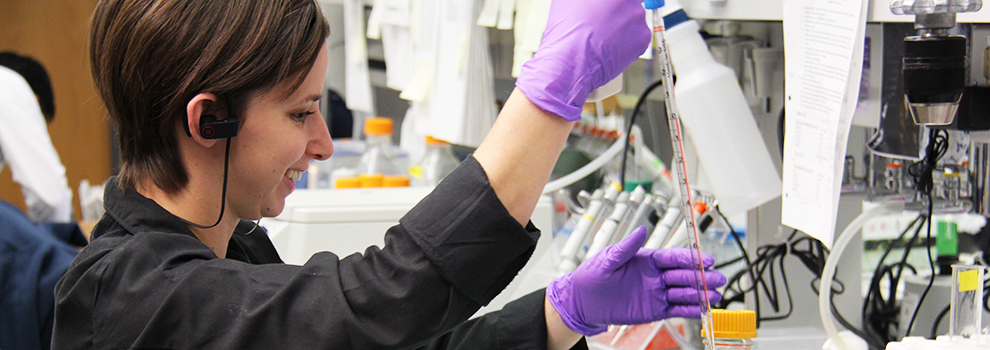
The Department of Psychiatry offers three specialty tracks for residents who desire a special emphasis on research, geriatric psychiatry, or child and adolescent psychiatry during their residency training.
Research Track
The UI Department of Psychiatry offers a research track (RT) for selected residents with a strong interest in research. Typically, these individuals will have demonstrated interest through prior research experiences, publications, and presentations. The expectation is that RT residents will develop into highly skilled physician-scientists. RT residents are assigned a faculty mentor to help begin the process of professional development. The mentor is typically a senior investigator in the trainee’s area of interest. Thus, research mentors are also available in other departments within the Carver College of Medicine. Residents are provided with dedicated research time during their four years of training. These experiences involve supervised laboratory and/or clinic experimentation, as well as independent scholarly literature review. Click to learn more about the research track.
PGY-1
- Resident is assigned a faculty mentor
- Training plan is developed to fit trainee’s research interests
- One block dedicated to research experience
PGY-2
-
Two blocks dedicated to research experience
PGY-3
- Resident transitions to outpatient clinic blocks in third year
- 40% effort (2 days per week) allotted to research experience
PGY-4
- Continued engagement in research block electives as able
- Develop applications for fellowship training or individual career development award
- Apply for faculty positions, if desired
RT residents are encouraged to publish a scholarly review or empirical experimental findings. They are additionally encouraged to participate in a national or international scientific meeting (supported by the department).
The RT resident may also be eligible to enter the Physician Scientist Training Pathway (PSTP). Find additional information about the PSTP program here.
Child and Adolescent Psychiatry (CAP) Track
Residents in the General Psychiatry Training Program with interest in completing a CAP fellowship have the opportunity to participate in our Child and Adolescent Psychiatry (CAP) track.
Residents accepted into the CAP track will have the following experiences during their General Psychiatry training:
PGY-1
- Assigned Child and Adolescent faculty mentor
- 1-2 blocks of Pediatrics as part of primary care requirement
- Invitations to CAP didactics
PGY-2
- Optional second year COC clinic in the CAP outpatient clinic
- 2-3 blocks of Child and Adolescent psychiatry (inpatient and outpatient)
- Invitations to CAP didactics
- Opportunities to receive mentorship from CAP research faculty
PGY-3
- One half-day of CAP clinic during the third year outpatient clinic experience
- Opportunities to co-facilitate outpatient DBT group with adolescents
- Opportunity to participate in preschool observation or autism full team evaluations
PGY-4 & 5
- Resident formally enters the CAP Residency
For more details related to the University of Iowa’s Child and Adolescent Psychiatry Residency, please visit the program’s webpage.
Public and Rural Health Track
The Public and Rural Psychiatry Track is designed to provide an added focus for residents who are passionate about mental healthcare delivery models and would like increased experiences in the public psychiatry sector. Residents who complete the track will be equipped to become leaders in community psychiatry and engaged in population-level mental healthcare. Residents will be introduced to a variety of models of care throughout their training. The goal of the track is to increase the number of psychiatrists prepared to meet the recruitment and retention needs of public agencies in Iowa.
Residents are assigned a mentor who has an interest in public and rural psychiatry to work with throughout their training. During the four years of psychiatry training, a variety of additional opportunities are available to track residents, including family medicine rotations in rural communities, opportunities to work with community agencies, participate in telepsychiatry to rural communities, engage in additional lectures and workshops focused on public and rural psychiatry, and work in a variety of psychiatry practices located in rural Iowa settings.
Intellectual and Developmental Disability (IDD) Track
The UI Department of Psychiatry offers an Intellectual and Development Disability (IDD) Track to psychiatry residents who are interested in obtaining specialized training, education and experience in working with individuals with an intellectual and/or development disability (IDD). UI Health Care Medical Center is home to numerous specialized programs which all focus on improving the lives of individuals with IDD through clinical care, education, advocacy and research. This track can be tailored to focus on clinical, advocacy and/or research experiences depending on the learner’s interests. For residents that want to focus on research, this track can be combined with the Research Track at UI Health Care Medical Center.
The IDD Track supervisor will work with each resident in this track to tailor their experiences to their individual interests. In addition there will be a monthly IDD journal club offered to all IDD Track participants.
Interventional Psychiatry (IPSY) Track
The division of Interventional Psychiatry at the University of Iowa has robust clinical and research programs involving different treatment modalities. Clinically, we have an active Electroconvulsive Treatment (ECT) service performing over 2,000 treatments each year. Our Transcranial Magnetic Stimulation (TMS) program administers treatment for depression and obsessive-compulsive disorder (OCD), and also performs navigated TMS for pre-surgical mapping. Trainees can receive exposure to a variety of TMS stimulators and neuronavigation equipment from different manufacturers (Magventure, Magstim, Nexstim, Localite, Brainsight, and other). We have active and growing intranasal esketamine and intravenous ketamine services. In addition, we are the only site in the state of Iowa and one of few in the Midwest region with an interdisciplinary team capable of managing patients with Deep Brain Stimulation (DBS) for treatment of OCD and Vagus Nerve Stimulation (VNS) for the treatment of refractory depression.
Roughly half of our IPSY faculty are research/tenure-track faculty and we have active research programs involving TMS, ECT, DBS, and esketamine. We are involved in the GenECT study and have been identified as one of four sites in the U.S. to recruit subjects for an inpatient accelerated intermittent theta-bust stimulation (aiTBS) trial. We also maintain a biomarker registry of patients who receive interventional treatments and have close collaborations with the departments of Neurology and Neurosurgery, as well as the Iowa Neuroscience Institute.
The main objective of the IPSY track is to develop psychiatrists highly skilled in the assessment for and delivery of IPSY treatment modalities. Enrollment in this track provides opportunity for close mentorship with IPSY faculty as well as expanded exposure to the IPSY service. Residents’ experience will be tailored to their individual interests. For those interested in research, enrollment in the IPSY track may be combined with enrollment in the Physician Scientist Training Pathway.
For inquiry on the IPSY track, please contact Dr. Anthony Purgianto (anthony-purgianto@uiowa.edu).
Research Track
Research Track
The UI Department of Psychiatry offers a research track (RT) for selected residents with a strong interest in research. Typically, these individuals will have demonstrated interest through prior research experiences, publications, and presentations. The expectation is that RT residents will develop into highly skilled physician-scientists. RT residents are assigned a faculty mentor to help begin the process of professional development. The mentor is typically a senior investigator in the trainee’s area of interest. Thus, research mentors are also available in other departments within the Carver College of Medicine. Residents are provided with dedicated research time during their four years of training. These experiences involve supervised laboratory and/or clinic experimentation, as well as independent scholarly literature review.
PGY-1
- Resident is assigned a faculty mentor
- Training plan is developed to fit trainee’s research interests
- One block dedicated to research experience
PGY-2
- Two blocks dedicated to research experience
PGY-3
- Resident transitions to outpatient clinic blocks in third year
- 40% effort (two days per week) allotted to research experience
PGY-4
- Continued engagement in research block electives as able
- Develop applications for fellowship training or individual career development awards
- Apply for faculty positions, if desired
RT residents are encouraged to publish a scholarly review or empirical experimental findings. They are additionally encouraged to participate in a national or international scientific meeting (supported by the department).
The RT resident may also be eligible to enter the Physician Scientist Training Pathway (PSTP). Find additional information about the PSTP program here.
Child and Adolescent Psychiatry (CAP) Track
Child and Adolescent Psychiatry (CAP) Track
Residents in the General Psychiatry Training Program with interest in completing a CAP fellowship have the opportunity to participate in our Child and Adolescent Psychiatry (CAP) track.
Residents accepted into the CAP track will have the following experiences during their General Psychiatry training:
PGY-1
- Assigned Child and Adolescent faculty mentor
- 1-2 blocks of Pediatrics as part of primary care requirement
- Invitations to CAP didactics
PGY-2
- Optional 2nd year COC clinic in the CAP outpatient clinic
- 2-3 blocks of Child and Adolescent psychiatry (inpatient and outpatient)
- Invitations to CAP didactics
- Opportunities to receive mentorship from CAP research faculty
PGY-3
- One half-day of CAP clinic during the 3rd year outpatient clinic experience
- Opportunities to co-facilitate outpatient DBT group with adolescents
- Opportunity to participate in preschool observation or autism full team evaluations
PGY-4 & 5
- Resident formally enters the CAP Residency
For more details related to the University of Iowa’s Child and Adolescent Psychiatry Residency, please visit the program’s webpage.
Public and Rural Health Track
Public and Rural Health Track
The Public and Rural Psychiatry Track is designed to provide an added focus for residents who are passionate about mental healthcare delivery models and would like increased experiences in the public psychiatry sector. Residents who complete the track will be equipped to become leaders in community psychiatry and engaged in population-level mental healthcare. Residents will be introduced to a variety of models of care throughout their training. The goal of the track is to increase the number of psychiatrists prepared to meet the recruitment and retention needs of public agencies in Iowa.
Residents are assigned a mentor who has an interest in public and rural psychiatry to work with throughout their training. During the four years of psychiatry training, a variety of additional opportunities are available to track residents, including family medicine rotations in rural communities, opportunities to work with community agencies, participate in telepsychiatry to rural communities, engage in additional lectures and workshops focused on public and rural psychiatry, and work in a variety of psychiatry practices located in rural Iowa settings.
Intellectual and Developmental Disability (IDD) Track
Intellectual and Developmental Disability (IDD) Track
The UI Department of Psychiatry offers an Intellectual and Development Disability (IDD) Track to psychiatry residents who are interested in obtaining specialized training, education and experience in working with individuals with an intellectual and/or development disability. UI Health Care Medical Center is home to numerous specialized programs which all focus on improving the lives of individuals with IDD through clinical care, education, advocacy, and research. This track can be tailored to focus on clinical, advocacy, and/or research experiences depending on the learner’s interests. For residents that want to focus on research, this track can be combined with the Research Track at UI Health Care Medical Center.
The IDD Track supervisor will work with each resident in this track to tailor their experiences to their individual interests. In addition there will be a monthly IDD journal club offered to all IDD Track participants.
Interventional Psychiatry (IPSY) Track
Interventional Psychiatry (IPSY) Track
The division of Interventional Psychiatry at the University of Iowa has robust clinical and research programs involving different treatment modalities. Clinically, we have an active Electroconvulsive Treatment (ECT) service performing over 2,000 treatments each year. Our Transcranial Magnetic Stimulation (TMS) program administers treatment for depression and obsessive-compulsive disorder (OCD), and also performs navigated TMS for pre-surgical mapping. Trainees can receive exposure to a variety of TMS stimulators and neuronavigation equipment from different manufacturers (Magventure, Magstim, Nexstim, Localite, Brainsight, and other). We have active and growing intranasal esketamine and intravenous ketamine services. In addition, we are the only site in the state of Iowa and one of few in the Midwest region with an interdisciplinary team capable of managing patients with Deep Brain Stimulation (DBS) for treatment of OCD and Vagus Nerve Stimulation (VNS) for the treatment of refractory depression.
Roughly half of our IPSY faculty are research/tenure-track faculty and we have active research programs involving TMS, ECT, DBS and esketamine. We are involved in the GenECT study and have been identified as one of four sites in the U.S. to recruit subjects for an inpatient accelerated intermittent theta-bust stimulation (aiTBS) trial. We also maintain a biomarker registry of patients who receive interventional treatments and have close collaborations with the departments of Neurology and Neurosurgery, as well as the Iowa Neuroscience Institute.
The main objective of the IPSY track is to develop psychiatrists highly skilled in the assessment for and delivery of IPSY treatment modalities. Enrollment in this track provides opportunity for close mentorship with IPSY faculty as well as expanded exposure to the IPSY service. Residents’ experience will be tailored to their individual interests. For those interested in research, enrollment in the IPSY track may be combined with enrollment in the Physician Scientist Training Pathway.
For inquiry on the IPSY track, please contact Dr. Anthony Purgianto (anthony-purgianto@uiowa.edu).
Research Opportunities
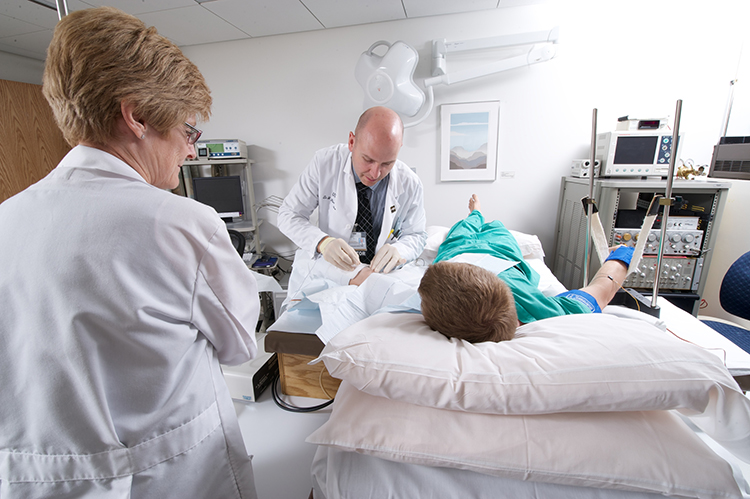
At the University of Iowa, residents with and without previous research experience have the opportunity to participate in research during residency. They are encouraged to select a project and a mentor that is tailored to their areas of interest. For selected residents with previous research experience and with a strong interest in a career as a physician-scientist, the program offers a formal Research Track. This includes unique resources from within the Department of Psychiatry, and is further enhanced via our partnership with the University of Iowa’s Physician-Scientist Training Pathway.
The Psychiatry Research Track at the University of Iowa supports residents’ career development as future physician-scientists. A limited number of residents are admitted to this track as it is designed for those who have developed laboratory or clinical research skills prior to entering residency.
Through the Iowa Neuroscience Institute, the University of Iowa remains a leader in ongoing neuroscience research. The institute allows for neuroscience research to be conducted collaboratively, amongst scientists in diverse fields of study. A few areas of research include neurodegenerative diseases, molecular psychiatry, and behavioral neuroscience. Additionally, the University is home to the Iowa Neuroimaging Consortium, recognized as one of the founding leaders in the field of neuroimaging. Important research across many domains in psychiatry is also moving forward at Iowa in conjunction with the Hawk-Intellectual and Developmental Disabilities Research Center (Hawk-IDDRC), Iowa Institute of Human Genetics, Scanlan Center for School Mental Health, and the Native Center for Behavioral Health among other vibrant research programs.
Participating residents may tailor this track to meet their individual needs and interests. Each resident is paired with a mentor who provides supervision and evaluates the resident’s progress. Each participant will also become part of the broader Carver College of Medicine Physician-Scientist Training Pathway, and thus benefit from the interaction with trainees from Medicine, Pediatrics, Neurology, and other departments.
Residents participating in the University of Iowa Psychiatry Research Track have the opportunity set aside significant amounts of time during training to develop their research projects. Our research track residents can set aside up to 8% research time in the first year, 23% research time in their second year, and up to an average of 50% research time over the third and fourth years (residents have the flexibility to decide how they want these years structured).
Additionally, funding support for research projects is available. The University of Iowa Physician Scientist Training Program provides up to $4,000 pear year to support the costs of research projects for participating residents. Residents are also able to apply for additional funding for research through multiple internal grant-supported programs including the Institute for Clinical and Translational Science, Hawk-IDDRC, Pappajohn Biomedical Institute Microfinance Program, and the Mollie Tibbetts Memorial Fund for Child & Adolescent Psychiatry.
Mark Niciu, MD, PhD
Assistant Professor of Psychiatry
Faculty Advisor, Psychiatry Resident Research Track
Some of our current residents participating in the Physician-Scientist Training Program (PSTP):
Amanda Benavides, MD, PhD

Dr. Benavides is a graduate of the University of Iowa’s Medical Scientist Training Program and earned her PhD in Neuroscience. Some of her work to date includes examining early brain imaging outcomes, with a plan to translate these neuroimaging techniques into projects involving young patients at risk for psychotic disorders as part of the Psychosis-risk Intervention, Education, and Research (PIER) Program, a comprehensive clinical research center at the University of Iowa with goals of addressing the mental health needs of those aged 12-45 who are experiencing unusual changes in their mood, thoughts, perception, and/or behavior. Other current research interests include an upcoming pilot study on Psilocybin-Assisted vs Ketamine-Assisted Psychotherapy for Alcohol Use Disorder.
Carly van der Heide, MD, PhD
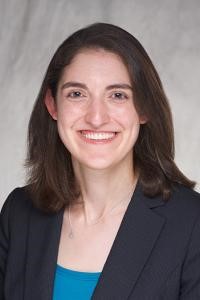
Dr. van der Heide has a special interest in working with individuals with intellectual disabilities. She is completing the residency program’s Intellectual and Developmental Disability (IDD) Track and is also involved in research focused on rare genetic mutations that are associated with intellectual disability, epilepsy, and autism. She is interested in using informatics approaches to work towards a better understanding of ways to improve care for individuals with intellectual disabilities. She is originally from California and is a graduate of the University of Iowa Medical Scientist Training Program with a PhD in molecular physiology and biophysics.
Jackson Richards, MD, PhD

Dr. Richards completed a PhD in oncological sciences before discovering his passion for psychiatry. He brings his background in exploring the mechanism of disease and pursuing personalized medicine to the study of mental illness. His primary areas of interest are mood disorders and interventional psychiatry, particularly neuromodulation. Dr. Richards is currently working with Dr. Nick Trapp on novel applications of rTMS.
Our INSPIRE T32 Research Fellowship Program also provides meaningful resources and mentorship for individuals beginning a career as a physician-scientist, and research track residents can pursue this fellowship program after residency graduation.
Some graduates of our INSPIRE T32 Research Fellowship Program:
Nick Trapp, MD
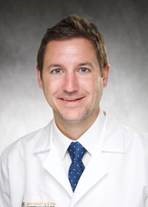
Dr. Trapp is a psychiatrist and neuroscientist at the University of Iowa who specializes in procedural treatments for neuropsychiatric conditions. He is currently the director of the interventional psychiatry service. He grew up in Cary, Illinois in the suburbs of Chicago. He is a graduate of the University of Notre Dame where he received Bachelor degrees in Sociology and Preprofessional Studies, and remains an avid Notre Dame football fan. He completed medical school at the University of Nebraska Medical Center in Omaha, NE, followed by residency training in psychiatry at Washington University in St. Louis. He completed a 2-year neuromodulation and neuroscience fellowship program at the University of Iowa in 2019, where he is currently serving as an Assistant Professor. Most recently, he completed a 1-year Neuropsychiatry and Behavioral Neurology fellowship at Stanford University. Dr. Trapp’s research focuses on clinical and translational projects related to brain stimulation. Interests include neuropsychiatry, neurostimulation, traumatic brain injury, device development, clinical trials, treatment-resistant mood disorders, scientific communication, education, and neuroimaging. Non-clinical interests include sports, hiking, reading, travel, and spending time with his wife and kids.
https://trapp.lab.uiowa.edu/people-0
Aubrey Chan, MD, PhD

Mental illnesses such as anxiety disorder are very common but have always been challenging to study because most symptoms are subjective, qualitative, and can vary widely across different individuals. The brain is also more complex than many other organs because different regions of the brain can serve very different functions. Our goal is to identify objective neurophysiologic patterns that underlie subjective responses to threats and other stimuli. We are also interested in connecting behavior with body physiology such as changes in respiration. We use mouse models and implanted electrodes to measure and analyze field potential and individual neuron activity during responses to different stimuli. Parallel studies in human subjects are also underway in collaboration with the neurosurgery department.
Research areas
- Cellular and molecular neuroscience
- Systems neuroscience
- Behavioral neuroscience
- Computational neuroscience
- Ion channels
- Psychiatric disorders
- Frontal cortex
- Amygdala
- Fear learning
- Respiration
- In vivo electrophysiology
- Transgenic models
- Animal behavior
Learn more about:
Physician-Scientist Training Pathway
Our Physician-Scientist Training Pathway allows residents to continue to develop as scientists and to keep abreast of advances in technology and in their area of research.
A limited number of residents are admitted to this program as it is designed for those who have developed laboratory or clinical research skills prior to entering residency.
Residents may elect to spend up to three months of each post-graduate year in a molecular genetics, neuroscience, or neuropharmacology laboratory, or in a clinical neuroscience laboratory, to learn new techniques or to assist in on-going research projects.
Participating residents may tailor this track to meet their individual needs and interests.
Each resident is paired with a mentor who provides supervision and evaluates the resident’s progress. Each participant will also become part of the broader Carver College of Medicine Physician-Scientist Training Pathway, and thus benefit from the interaction with trainees from medicine, pediatrics, neurology, and other departments.
Psychotherapy Training
The psychotherapy curriculum includes longitudinal training through weekly didactic seminars, psychotherapy supervision, and clinic experiences.
During the PGY-1 year, residents will have weekly didactics seminars on the topics of supportive therapy, motivational interviewing, and mindfulness.
In the PGY-2 year, training expands to include Cognitive Behavioral Therapy, Dialectical Behavior Therapy, Group Therapy, and Family Therapy. Second-year residents begin getting exposure to CBT and DBT group therapy sessions while on selected clinical rotations. As early as the PGY-2 year, residents can begin seeing psychotherapy patients in the adult psychiatry clinic.
For PGY-3 residents, psychotherapy seminars are lengthened to include the theoretical basis and practical aspects of Cognitive-Behavioral Therapy (an advanced seminar series), Psychodynamic Therapy, Mentalization-Based Therapy, and Acceptance and Commitment Therapy.
During the PGY-3 and -4 years, residents see patients for individual therapy on a weekly basis, and they meet weekly with their assigned psychotherapy supervisor. Residents have one half-day per week starting in their third year dedicated to seeing psychotherapy patients.
Another opportunity for psychotherapy training includes co-leading one of the department’s STEPPS groups, designed to support patients diagnosed with Borderline Personality Disorder. The program, originally developed by clinicians at the University of Iowa, is utilized on an international scale as an evidence-based treatment for BPD.
Residents may also choose from a variety of psychotherapy-specific electives during their PGY-4 year. Learn more about elective opportunities. Residents can also elect to use their CME funds to attend a conference for more in-depth training into a specific psychotherapy.
DEI Initiatives
Our department and residency training program are strongly invested in DEI intiatives with a focus on continuing to enhance diversity, equity, and inclusion within our training programs and departmental activities. Some of our DEI activities and initiatives include:
- A funded Vice Chair for DEI faculty position
- A DEI Chief Resident position
- Monthly Departmental DEI meetings, co-led by a resident appointee and by our department’s Vice Chair for DEI
- A summer DEI grand rounds series each year
- A fully-funded visiting clerkship for students from groups which are underrepresented in medicine (URM) -- students must apply and be selected for this rotation
- A medical student–resident mentorship pairing program for URM students
- A segment in each monthly Program Director’s lunch meeting called All Voices, focusing on DEI issues and resources for healthcare providers
- Invited lectures on a wide variety of topics, including Implicit Bias and Addressing Patient-Initiated Identity-Based Harassment
- Consistent representation from our program’s residents over many years within multiple national DEI initiatives, including the APA Diversity Leadership Fellow Program and the SAMSHA Minority Leadership Fellow Program
Social Opportunities
An outstanding feature of the Psychiatry Residency Program at University of Iowa Health Care Medical Center is the camaraderie among residents. Residents enjoy many activities together, including casual get-togethers, annual parties, and conferences.
- Welcome Dinner at the Chairman’s house
- Matball - Residents vs. Faculty
- Iowa State Fair (a group of residents go most years)
- Karaoke
- Halloween Party
- Ugly Sweater Party
- Super Bowl Party
- Doc Dash
- NAMI Walk
- Trivia nights
- Orchard visit
- Local minor league games (baseball, indoor football, hockey)
- Farmer’s market visits
- Community Theater and Shakespeare in the Park
- Physician on the Hill Day (a group of residents joined visited with congress people at the state capitol)
- Several conferences including APA (American Psychiatric Association), IPS (Iowa Psychiatric Society), AMP (Association of Medicine and Psychiatry) and others
Honors and Recognition

Marisa Ascencio, MD
22-23 UIHC Quality Leadership Academy
2022 Graduated from the HEAL-USA Program, launched by UT Southwestern's Office of Faculty Diversity & Development
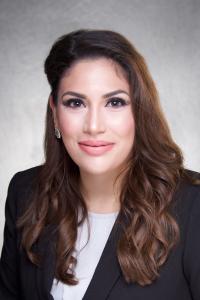
Amanda Benavides, MD, PhD
2023 Honorable Mention recognition for the National Institute of Mental Health (NIMH) Outstanding Resident Award
APA Diversity Leadership Fellow
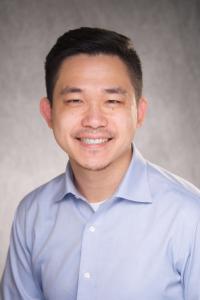
Bill Chen, MD
2023 UIHC GME Excellence in Clinical Teaching Nominee
2021 ACLP Annual Meeting Training Grant for CLP

Lena Maginot, MD
23-24 UIHC Quality Leadership Award

Brooke Olson, MD
23-25 APA Public Psychiatry Fellowship

Jackson Richards, MD, PhD
2023 UIHC GME Excellence in Clinical Teaching Award

Carolyn Wong, MD
2022 University of Iowa Carver College of Medicine Student Government (CCOMSG) M4 Resident of the Year

Nicole Woodson-DeFauw, MD
APA/SAMHSA Substance Abuse Minority Fellowship

Kevin John Rivera, MD
APA/APAF Diversity Leadership Fellowship
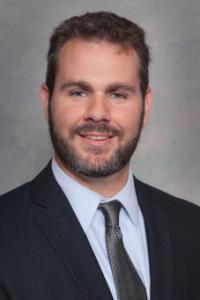
Stephen Brennan, MD
UIHC Quality Leadership Academy
Resident Publications
Brandon Neisewander, MD
- Nicholas T. Trapp, M.D., M.S., Benjamin D. Pace, M.S., Brandon Neisewander, M.D., Patrick Ten Eyck, Ph.D., Aaron D. Boes, M.D., Ph.D. A randomized trial comparing Beam F3 and 5.5 cm targeting in rTMS treatment of depression demonstrates similar effectiveness. Brain Stimulation. 2023 Sep 14;16(5):1392-1400. Epub ahead of print. PMID: 37714408.
- Neisewander, B., & Trapp, N. (2023). Electroconvulsive therapy complicated by ventricular fibrillation: A case report. Annals of clinical psychiatry: official journal of the American Academy of Clinical Psychiatrists, 35(2), 133-134. https://doi.org/10.12788/acp.0105
- Neisewander B. (2023). Idiopathic burning mouth syndrome treated with electroconvulsive therapy. Annals of clinical psychiatry : official journal of the American Academy of Clinical Psychiatrists, 35(1), 137–138. https://doi.org/10.12788/acp.0099 PMID: 36716469
- Neisewander, B., & McGinty, K. (2023). The Practitioner's Guide to the Science of Psychotherapy. American journal of psychotherapy, appipsychotherapy20220051. Advance online publication. https://doi.org/10.1176/appi.psychotherapy.20220051 PMID: 36762390
- Writing selected for the Editor’s Choice in Psychiatric Services for the October 2021 Issue
Nicholas Bormann, MD
- Bormann NL, Borcherding N, Crotts SB, Ortolan LS, et al. A transcriptomic map of murine and human alopecia areata. JCI Insight. 2020 Jul;5(13). DOI: 10.1172/jci.insight.137424.
Jacob Miller, MD, PhD
- Miller JN, van der Plas E, Hamilton MJ, Miller JN, et al. Brain Structural Features of Myotonic Dystrophy Type 1 and their Relationship with CTG Repeats. Journal of Neuromuscular Diseases. 2019 ;6(3):321-332. DOI: 10.3233/jnd-190397.
- Miller JN, Black DW. Bipolar Disorder and Suicide: a Review. Current Psychiatry Reports. 2020 Jan;22(2):6. DOI
Nicholas Bormann, MD
- Bormann NL, Allen J, Shaw M, Black DW. Religiosity and chance beliefs in persons with DSMIV pathological gambling enrolled in a longitudinal follow-up study. J Gambl Stud. 2019 Borcherding N, Bormann NL, Voigt AP, Zhang W. TRGAted: A web tool for survival analysis using protein data in the Cancer Genome Atlas. F1000Res. 2018;7:1235.
- Shinozaki G, Bormann NL, Chan AC, et al. Identification of high mortality risk patients and prediction of outcomes in delirium by Bispectral EEG. J Clin Psychiatry, 2019 in press.
- Kolb R, Kluz P, Tan ZW, Borcherding N, Bormann NL, ... , Zhang, W. Obesity-associated inflammation promotes angiogenesis and breast cancer via angiopoietin-like 4. Oncogene. 2019;38(13):2351-2363.
- Heinzman JT, Hoth KF, Cho MH, ... , Bormann NL, ... , Shinozaki G. GWAS and systems biology analysis of depressive symptoms among smokers from the COPDGene cohort. J Affect Disord. 2019;243:16-22.
Shea Jorgensen, MD
- Jorgensen SM. A Place Called Home. American Association of Community Psychiatrists Newsletter. 32(2), Oct 2018.
- Jorgensen SM, Jorgensen MC, Fiedorowicz JG, Williams NA. Increasing the impact of IMPACT on preventable health conditions. Poster presentation at the American Psychiatric Association IPS Conference, Chicago, IL. Oct 2018.
How to Apply
Applications for our residency program are only accepted through the Electronic Residency Application System (ERAS), and all applicants must also register with the National Resident Matching Program (NRMP).
We accept applications from Sept. 1 through Dec. 31. Selected candidates will be invited to interview.
Interview invitations are offered on a rolling basis. Applicants will have a 7-day time period to accept their invitation to interview with our program, and we do not extend a greater number of invitations to interview than the number of available interview slots.
A complete Electronic Residency Application System (ERAS) application includes:
- Curriculum vitae
- Medical school transcript
- USMLE or COMLEX transcript
- Dean's letter of recommendation
- Three letters of recommendation from clinical faculty
- One page personal statement
- Photo (optional)
Our program will be collecting and reviewing data from applicants’ supplemental ERAS applications. Completion of the standard MyERAS application is a requirement; completion of the supplemental ERAS application is optional.
In its second year of use, the supplemental ERAS application is designed to help applicants share more information about themselves and assist our program in finding applicants that fit our program’s setting and mission. There is no cost to applicants and participation is optional.
The supplemental ERAS application provides:
- geographic preferences (by division and by urban or rural setting);
- information about an applicant’s most meaningful experiences and other impactful life events, if applicable; and
- program signals.
The supplemental ERAS application will be delivered on a survey platform that is separate from the MyERAS application.
Learn more about the AAMC supplemental ERAS application.
How to Apply for the Physician Scientist Training Program (PSTP)
The University of Iowa Health Care Medical Center has a strong track record and decades of experience in combined research and clinical training of successful physician-scientists. To learn more about our Physician Scientist Training Program (PSTP), please visit the program’s website.
If you would like to apply to the PSTP program to pursue a research track in psychiatry residency, please submit your PSTP application at the same time that you submit your application to our residency training program.
Application Materials and Deadline
A complete Electronic Residency Application System (ERAS) application includes:
- Curriculum vitae
- Medical school transcript
- USMLE or COMLEX transcript
- Dean's letter of recommendation
- Three letters of recommendation from clinical faculty
- One page personal statement
- Photo (optional)
Deadline
Applications must be received by Dec. 31.
Applicants will be invited for interviews following the review of completed applications. Interviews are conducted November through January.
Eligibility
The Department of Psychiatry utilizes a holistic review of residency candidates. Components of the holistic review process include:
- Personal Statement
- Professional/personal experiences
- Applicant interviews
- Letters of recommendation/MSPE (Dean’s letter)
- Academic achievements/Standardized test scores
See below for more specific application requirements.
US Allopathic Medical School Graduates
- Has passed USMLE Step 1.
- Application via the Electronic Residency Application System (ERAS) including:
- A minimum of three letters of recommendation (letters from psychiatry supervisors are preferable if possible);
- Dean’s letter;
- Medical school transcript verifying appropriate medical education to train in a large teaching hospital;
- Personal statement (there are no specific requirements for the personal statement but in general it should explain why you are interested in a psychiatry residency and justify why you would be a good candidate); and
- Photograph.
- We do not require a “Chairman’s Letter.”
US Osteopathic Medical School Graduates
- Has passed COMLEX Step 1.
- Application via the Electronic Residency Application System (ERAS) including:
- A minimum of three letters of recommendation (letters from psychiatry supervisors are preferable if possible);
- Dean’s letter;
- Medical school transcript verifying appropriate medical education to train in a large teaching hospital;
- Personal statement (there are no specific requirements for the personal statement but in general it should explain why you are interested in a psychiatry residency and justify why you would be a good candidate); and
- Photograph.
- We do not require a “Chairman’s Letter.”
International Medical School Graduates
- Has passed USMLE Step 1 Clinical Skills Exam.
- Appropriate medical education to train in a large US teaching hospital.
- Previous psychiatry residency experiences, observership or clinical experience in the US is strongly preferred.
- Previous degree in US, (i.e. MPH) is also desirable.
- Application via the Electronic Residency Application System (ERAS) including:
- A minimum of three letters of recommendation (letters from psychiatry supervisors are preferable if possible);
- Dean’s letter;
- Medical school transcript verifying appropriate medical education to train in a large teaching hospital;
- Personal statement (there are no specific requirements for the personal statement but in general it should explain why you are interested in a psychiatry residency and justify why you would be a good candidate); and
- Photograph.
- We do not require a “Chairman’s Letter.”
- US citizenship, green card, or a J-1 Visa are preferred. H1 visas may be considered on a case by case basis.
Couples Match
We encourage couples match applications and will make every attempt to streamline interview dates and times for both applications. More information on couples matching can be found on the National Resident Matching Program website.
The Interview
All interview invitations will be sent out through Interview Broker. Applicants will be able to self-schedule into their preferred date and can be added to a waiting list as well. All sessions will be conducted live virtually via Zoom. An interview day will include the following:
Night Prior to the Interview
- Social Hour with the Residents
Interview Day
- Begins at 8:30 a.m. (Central Time)
- Program Overview Presentation with the Chief Resident
- Welcome with the Department Chair
- Interviews with the Program Director, Associate Program Director, Chief Resident and a Faculty Member
- Group Wrap-up with the Program Director
- Concludes at 12:50 p.m. (Central Time)
Our People
 It takes a special person to dedicate his or her life to the care of individuals with mental health issues. At Iowa, you will be exposed to some of the best clinicians, researchers, and educators in the profession. Through formal mentoring and an open-door philosophy, we provide high-powered opportunities for you to learn career-long lessons.
It takes a special person to dedicate his or her life to the care of individuals with mental health issues. At Iowa, you will be exposed to some of the best clinicians, researchers, and educators in the profession. Through formal mentoring and an open-door philosophy, we provide high-powered opportunities for you to learn career-long lessons.
From clinicians to researchers, receptionists to administrative support staff, you will find our department is a friendly place staffed by people committed to helping you achieve your full potential, reach your career goals, and ultimately become the best psychiatrist you can be.
The Department of Psychiatry has a faculty of more than 80 professionals whose clinical, teaching, and research expertise spans the entire discipline.
Full list of faculty members in the Department of Psychiatry.
Current Residents
PGY-1

Hannah Serafin, MD
Medical School: University of Iowa Roy J. And Lucille A. Carver College of Medicine

Olivia Gray, MD
Medical School: University of Minnesota Medical School

Katherine Harbeck, DO
Medical School: Des Moines University College of Osteopathic Medicine

Chu Hsiao, MD, PhD
Medical School: University of Florida College of Medicine

Heather Lamoureux, MD
Medical School: Central Michigan University College of Medicine

Lorenzo Manalo, MD
Medical School: Chicago Medical School at Rosalind Franklin University of Medicine & Science

Chelsey Oxford, DO
Medical School: Idaho College of Osteopathic Medicine
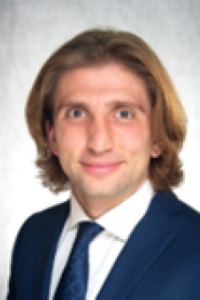
Nolan Redetzke, MD
Medical School: University of Iowa Roy J. And Lucille A. Carver College of Medicine
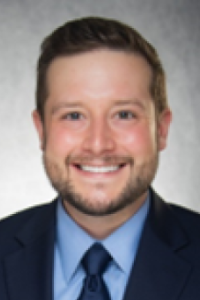
Thomas Romano, MD
Medical School: University of Iowa Roy J. And Lucille A. Carver College of Medicine
PGY-2
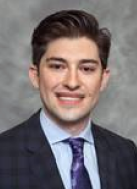
Daniel Bor, MD
Undergraduate School: University of Colorado, Denver
Medical School: Medical College of Wisconsin
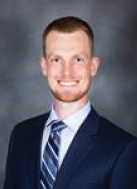
Brady Carlberg, MD
Undergraduate School: South Dakota State University
Medical School: University of Minnesota Medical School

Kaitlin Geisenhof, MD
Undergraduate School: College of St. Benedict
Medical School: University of Minnesota Medical School, Duluth

Brian Kinnaird, MD, MA
Undergraduate School: Drake University
Medical School: University of Iowa Roy J. and Lucille A. Carver College of Medicine
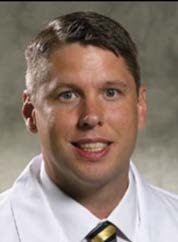
Brandon Maples, DO
Undergraduate School: University of Kansas
Medical School: A.T. Still University of Health Sciences, Kirksville College of Osteophathic Medicine

Luna Paudel, MBBS
Medical School: B.P. Koirala Institute of Health Sciences

Katie Shaughnessy, MD
Undergraduate School: University of Wisconsin-Madison
Medical School: University of Minnesota Medical School

Alexandra Tamura, MD
Undergraduate School: University of South Carolina
Medical School: University of South Carolina School of Medicine, Columbia
PGY-3

Justin Bartels, DO
Undergraduate School: University of Northern Iowa
Medical School: UNTHSC-TCOM
Professional Interests: Emergency Psychiatry, Psychotic Disorders
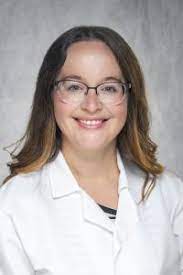
Alexis Hunter, MD
Undergraduate School: Colorado State University
Medical School: University of Colorado Medical School
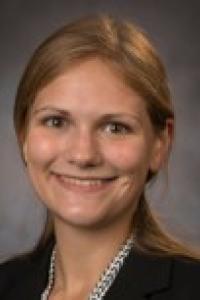
Kayla Holthaus, MD
Undergraduate School: Washington University-St. Louis
Medical School: Medical College of Wisconsin-Green Bay
Professional Interests: Palliative Care, Geriatrics

Sabina Imanbekova, MD
Undergraduate School: University of Utah
Medical School: University of Utah
Professional Interests: Interventional Psychiatry, Forensic/Correctional Psychiatry, Treatment-Resistent Depression

Magdalena Maginot
Undergraduate School: Indiana University Northwest
Medical School: Indiana University School of Medicine
Professional Interests: Community Psychiatry, Child Psychiatry
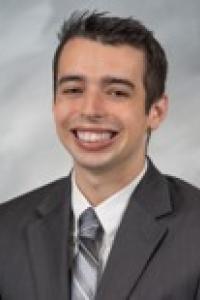
Christopher Merriman, MD
Undergraduate School: Loyola University Chicago
Medical School: Wayne State University
Professional Interests: Emergency Psychiatry, Eating Disorders

Jackson Richards, MD, PhD
Undergraduate School: University of Utah
Medical School: University of Utah
Professional Interests: Interventional Psychiatry, Neurostimulation, Reserarch, Bipolar Disorder, Addiction Medicine

Vijay Shah, MD
Undergraduate School: The Ohio State University
Medical School: The Ohio State University College of Medicine
Professional Interests: Inpatient Psychiatry, Interventional Psychiatry, Consult-Liaison Psychiatry

Jessica Smoko, MD
Undergraduate School: University of Wisconsin-Madison
Medical School: Medical College of Wisconsin-Milwaukee Campus
Professional Interests: Consult-Liaison Psychiatry

Dakota Sudbeck, DO
Undergraduate School: University of Maine
Medical School: Kansas City University
Professional Interests: Rural Psychiatry, Addiction Medicine, Inpatient Adult Psychiatry
PGY-4
Amanda Benevides Mostek, MD, PhD
Undergraduate school: St. Mary’s University
Medical school: University of Iowa Roy J. And Lucille A. Carver College of Medicine
Professional interests: General psychiatry; cultural psychiatry; Diversity initiatives in medicine, particularly mentorship; neurodevelopmental outcomes brain imaging research
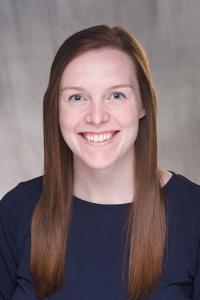
Alyssa Heinzman, MD
Undergraduate school: University of Northern Iowa
Medical school: University of Iowa Roy J. And Lucille A. Carver College of Medicine
Professional interests: Adult psychiatry, perinatal psychiatry, psychotic disorders

Brooke Olson, MD
Undergraduate school: Ripon College
Medical school: University of Wisconsin School of Medicine and Public Health
Professional interests: Rural track, community and public psychiatry, SPMI population

Shannon Thoele, MD
Undergraduate school: Quincy University
Medical school: University of Illinois College of Medicine Rockford
Professional interests: Community psychiatry and forensic psychiatry
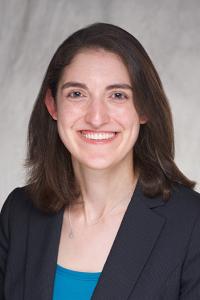
Carly Van der Heide, MD, PhD
Undergraduate school: University of California
Medical school: University of Iowa Carver College of Medicine
Professional interests: LGBTQ+ care, addiction medicine, eating disorders, psychotherapy
Past Residents

Pictured: 2024 graduating class for all educational programs in the Department of Psychiatry
Class of 2024
- Marisa Ascencio, MD, Child Psychiatry Fellowship, Northwestern University, Illinois
- Bailey Brooks, MD, Broadlawns, Des Moines, Iowa
- Jake Erickson, MD, Child & Adolescent Psychiatry Fellowship, UIHC, Iowa City, Iowa
- Logan Goetzinger, MD, Child & Adolescent Psychiatry Fellowship, UIHC, Iowa City, Iowa
- Anthony Lee, MD, Kaiser Healthcare System, California
- Katherine Meidl, MD, Public Psychiatry Fellowship, Yale School of Medicine, New Haven, CT
- Julian Moss, DO, Child & Adolescent Psychiatry Fellowship, University of Utah, Salt Lake City, UT
- Brandon Neisewander, MD, Addiction Psychiatry Fellowship, Medical College of Wisconsin, Milwaukee, WI
- Brennan Whitacre, MD, VAMC, Iowa City, IA
- Carolyn Wong, MD, Addiction Medicine Fellowship, UIHC, Iowa City, IA
Class of 2023
- Bill Chen, MD, MS, Consultation-Liason Psychiatry Fellowship, University of California
- Jonathan Heinzman, MD, Fellow, University of Iowa
- Seth Howdeshell, MD, Child & Adolescent Psychiatry Residency, Univeristy of Iowa
- Brandan Penaluna, MD, MBA, Mayo Clinic, Minnesota
- Kevo Rivera, MD, Public Psychiatry Fellowship, Columbia University & Faculty, New York City Children's Center, Brooklyn Campus
- Chantal Rozmus, DO, Abbe Community Mental Health Center, Iowa
- Rob Wanzek, MD, Practice, New York
- William Welsh, MD, Faculty, University of Iowa
- Sasha Wey, MD, Group Health Cooperative, Wisconsin
- Lori Wheeler, MD, PhD, Cedar Center Psychiatric Group, Iowa
- Xiaoxi Yang, MD, Unity Point St. Luke's, Iowa
Class of 2022
- Nicholas Bormann, MD, Addiction Psychiatry Fellowship, Indiana University
- Emira Deumic Shultz, MD, Faculty, University of Iowa
- Elizabeth Jarvis, MD, University Health, University Missouri-Kansas City School of Medicine
- Christopher Moreau, MD, Addiction Medicine Fellowship, University of Iowa
- Corinne Webb, MD, Ellie Family Services, Minnesota
Class of 2021
- Oluwemimo “Wemi” Adeyanju, MD, Private Practice, Atlanta
- Ashmita Banerjee, MD, Faculty, University of Iowa
- Joel Bricker, MD, Faculty, University of Iowa
- Desire Christensen, MD, MS, Aspirus, Stevens Point, Wis.
- Shannon Jans, MD, Vera French Community Mental Health Center, Davenport, Iowa
- Shea Jorgensen, MD, Prairie Ridge Integrated Behavioral Health, Mason City, Iowa
- Warren Kane, MD, Private Practice, Las Vegas
- Priya Larson, MD, Faculty, University of Iowa
- Melissa Ludgate, MD, Faculty, University of Iowa
- Kyle McGinty, MD, MPH, Faculty, University of Iowa
- Claire McKinley, MD, MS, University of Iowa C-L Psychiatry Fellowship
- James Min, MD, Faculty, University of Iowa
- Anthony Purgianto, MD, PhD, Faculty, University of Iowa
- Allister Wilton, MD, Faculty, University of Iowa
- Jingna Zhao, MD, Undecided
Class of 2020
- Joel Bricker, MD, University of Iowa C-L Psychiatry Fellowship
- Bryan Cobb, MD, Kaiser Permanente, Denver, Colo.
- Brandon Greenfield, MD, MA, Maryland
- James Jackson, MD, UCSF Global Health Fellowship
- Jeffrey Kendrick, MD, University of Iowa Psychiatry Fellowship
- John Liggins, MD, MS, Faculty, University of Iowa
- Jacob Miller, MD, PhD, University of Iowa INSPIRE Research Fellowship
- Ifeoluwa 'Ife' Osewa, MBBS, MPH, Mayo Clinic, Eau Claire, Wis.
- Dan Rohlf, MD, Tanana Valley Clinic, Fairbanks, Alaska
- Torie Tann, MD, Faculty, University of Iowa
- Allister Wilton, MD, University of Iowa Addiction Medicine Fellowship
- Aly Wood, DO, MBA, Psychiatric Associates & University of Iowa
Class of 2019
- Laura Gibbons, MD, Consultation-Liaison Psychiatry Fellowship, Brigham and Women's Hospital, Boston
- Yang Roby, MD, PhD, Staff, Baltimore Washington Medical Center, Glen Burnie, Md.
- Samuel Shultz, MD, Staff, University of Iowa Health Care Medical Center, Iowa City, Iowa & Psychiatric Associates, North Liberty, Iowa
- Michael Strong, MD, Consultation-Liaison Psychiatry Fellowship, University of Pennsylvania, Philadelphia
- Holly Van Den Beldt, MD, Staff, University of Iowa Health Care Medical Center, Iowa City, Iowa
Class of 2018
- Usha Chhatlani, MB, BS, Mercy Hospital, Des Moines, Iowa
- Francis Giuliani, MD, Staff, University of Iowa Health Care Medical Center, Iowa City, Iowa
- Royce Gray, MD, Emerald Coast Behavioral Hospital, Panama City, Fla.
- Kara Larsen, DO, Glendive Medical Center, Glendive, Mont.
- Rustin Licht, MD, Psychiatric Associates, North Liberty, Iowa
- Cyndi McCormick, DO, River Hills Community Health Center, Ottumwa, Iowa
- Emily Morse, DO, Staff, University of Iowa Health Care Medical Center, Iowa City, Iowa
- Richard Pardilla, MD, PeaceHealth, Eugene, Ore.
- Faisal Tai, MD, Private practice, Houston
Chair and Department Executive Officer Peggy Nopoulos
Welcome to the Department of Psychiatry at the University of Iowa! As the Department Chair, I am excited about our educational mission. We are a highly regarded psychiatry department nationally in clinical care and research. We similarly believe we are a top department in the educational domain, as we are deeply committed to excellence in teaching, and have had great success in turning out well trained and highly sought after residents. 
The department has been training psychiatrists since the 1920s, with the first of these being Dr. George Sprague, who graduated in 1922. He went on to a distinguished career that included being on the committee that wrote the first Diagnostic and Statistical Manual, or DSM, in 1952. The original program was created as part of the “psychopathic hospital” movement in which freestanding psychiatric hospitals were built in close association with a medical college. In 1991 the department was relocated to the new John Pappajohn Pavilion within the University of Iowa Health Care Medical Center, where the bulk of training now occurs.
Our program has continuously evolved in response to a continuous process of self-evaluation. In the past few years, Dr. Erin Crocker and his leadership team have revamped the overall didactic curriculum, reformatted the monthly Chair Rounds (a case conference led by rotating faculty), revised the psychotherapy didactics and training requirements for residents, implemented a small-scale outpatient experience for second-year residents, and developed resident “panels” for third-year residents in the university's outpatient clinic to create a more training cohesive experience.
Our faculty includes some of the world's most distinguished investigators whose presence contributes to a spirit of inquiry. For example, Dr. Nancy Andreasen, has made key contributions to our understanding of clinical features and brain structure changes in schizophrenia. The research of these and other experts provides residents with the latest information about the causes and treatments for many mental disorders.
Faculty members receive high marks for their teaching and for providing high quality patient care. Teaching occurs through didactic courses and seminars, but also through informal interactions. I personally see patients with our residents and discuss case formulation and management with them. A casual atmosphere encourages interaction between residents and faculty.
Many residents have published the results of research projects or literature reviews under the supervision of a faculty member, an activity that provides another valuable educational experience (about 60% do so). Recently, we have developed a formal “research track” that provides research opportunities and mentorship from the first year on for those residents deeply interested in research. Additionally, several of our residents have participated in the Carver College of Medicine’s Physician Scientist Training Program. This unique program provides opportunities for mentorship, peer support, and funding to support lab-based research.
Our goal is to provide residents with a broad education that will prepare them for life-long self-learning and dedication to the practice of psychiatry at the forefront of evolving knowledge. We seek to provide residents with a variety of educational experiences so that they may choose among the many available career options. Our residents consistently score high on national examinations and frequently receive national awards. These have recently included election as a Member-in-Training Trustee of the American Psychiatric Association, winning a Group for the Advancement of Psychiatry Fellowship, and winning a Geriatric Mental Health Foundation Scholarship. The success of former residents in both clinical practice and academic settings attests to their quality and to the effectiveness of our training program.
While many of our residents have gone into clinical positions, others have headed towards fellowships, including psychosomatics at the Cleveland Clinic and at Memorial Sloan Kettering Cancer Center, mental health services at the University of Washington, and schizophrenia research at Mt. Sinai in New York. Several of our residents have matched in prestigious child psychiatry fellowships at Yale and Boston Children’s Hospital (Harvard). We are quite proud of these trainees as their excellent placements point to the high quality of the people who train here. It reflects well on the educational experience that is provided by our training directors and by all of our teaching faculty. It also highlights the esteem in which our program is held by these other outstanding medical centers.
We welcome your interest in the department, and look forward to getting to know you and letting you know more about the terrific opportunities that exist here in Iowa City. Both the city and the department are wonderfully friendly places with a strong sense of community. Come have a look. You’ll like what you find!
Peggy Nopoulos, MD
Professor of Psychiatry, Neurology, and Pediatrics
Chair and Department Executive Officer of Psychiatry
Program Director

Erin Crocker, MD
Program Director
Clinical Professor of Psychiatry
Department of Psychiatry
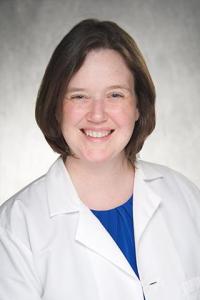
Holly Van Den Beldt, MD
Assistant Program Director
Clinical Assistant Professor
Department of Psychiatry
Chief Residents
Welcome to the Department of Psychiatry at the University of Iowa! As chief residents, we would like to introduce you to our program. We invite you to explore our website and learn more about the opportunities that make our program special.
Our department was founded in 1920 and has a longstanding tradition of excellence. Residents receive outstanding training through a combination of diverse clinical experiences, a comprehensive educational curriculum taught by expert faculty, and abundant opportunities for research. These elements are enhanced by a supportive learning environment and strong camaraderie among residents, fellows, and faculty, as well as administrators and support staff.
In addition to our four-year categorical psychiatry residency program, we have combined training programs in Internal Medicine-Psychiatry and Family Medicine-Psychiatry, along with multiple fellowships.
Our clinical training occurs primarily at the University of Iowa Health Care Medical Center – a tertiary care center which receives patient referrals from across Iowa as well as neighboring states. We also train at the Iowa City VA Medical Center and a variety of other community clinics.
We treat a diverse patient population with a wide range of psychiatric conditions. In addition to our general inpatient units, more unique services include a combined medicine-psychiatric unit, a geriatric unit, a crisis stabilization unit, and a unit for child and adolescent patients. Rotations on our interventional (ECT, TMS, Ketamine), substance use disorder, and consult-liaison services are routinely among the most highly rated educational experiences. Senior residents have opportunities to choose from a wide array of elective opportunities.
Iowa City is routinely ranked highly among the best places to live. It is a vibrant university town that offers a variety of cultural activities, outdoor festivals, restaurants, theater, night life, sporting events, and outdoor recreation. The area is family-friendly, with excellent school systems and activities for all ages.
We’d love to have you come visit our program and hope that you’ll consider the University of Iowa for the next step in your career!
Amanda Benavides Mostek, MD, PhD

Hometown: San Antonio, Texas
Undergraduate School: St. Mary’s University
Medical School: University of Iowa Roy J. & Lucille A. Carver College of Medicine, Interdisciplinary Graduate Program in Neuroscience
Professional Interests: Reproductive psychiatry/women’s mental health, interventional psychiatry, physician-scientist training program, with research interest in neuroimaging for those at risk for neuropsychiatric disorders
Personal Interests: Home improvement projects, photo organizing, Reality TV shows, Zumba, Pilates, spending time with all my nieces & nephews (I have 9!)
Why University of Iowa Psychiatry Residency Program?
I chose to continue my training here at Iowa due to the collaborative culture that is a hallmark of our institution, which I’ve personally seen in all areas of my training – including research, clinical, & leadership areas. We also get to train alongside our combined Family Medicine-Psychiatry & Internal Medicine-Psychiatry residents, who enrich our learning experiences. I have had so many opportunities for leadership roles, both at the institutional, state, & national level (APA fellowship) during my training, and our program really encourages and supports us participating in these. Our diverse training program has provided me with such a broad range of experiences in psychiatry with various specialty clinics & elective opportunities – both within our academic institution, but also in the community/rural setting. Finally, our program leadership continues to show that they will support each of our residents’ individual career and professional interests and will tailor our training experiences towards these personal aspirations, which is invaluable during residency training!
Brooke Olson, MD

Hometown: New London, Wisconsin
Undergraduate School: Ripon College, Ripon, Wisconsin
Medical School: University of Wisconsin School of Medicine and Public Health (UWSMPH)
Professional Interests: Rural Mental Health, Community and Public Psychiatry, SPMI, Organized Medicine, Advocacy
Personal Interests: Baking, Gardening, International Travel, Hiking, Nature Photography (Playing with Joe's dog Vino, bickering about football with Amanda's husband LOL)
Why University of Iowa Psychiatry Residency Program?
I chose the University of Iowa due to the diversity of inpatient and outpatient psychiatric experiences that are available through the residency that are not available at other residency programs. Even with specialized training opportunities at UIHC, I am able to go to community centers and rural areas to gain experiences in housing first apartments, FQHCs, CCBHCs, and various outreach programs while having the perks of training in an academic center and the safety net hospital of Iowa. We are trained with residents in combined training programs (Family Medicine- Psychiatry and Internal Medicine- Psychiatry) which promotes an environment of learning and support between medical specialties.
Joseph Rattenni, DO

Hometown: Wilmington, Delaware
Undergraduate School: University of Delaware
Medical School: Lincoln Memorial University - DeBusk College of Osteopathic Medicine
Professional Interests: Community Medicine / Psychiatry, Forensics, Psychotherapy / Psychoanalytics, Social Determinates of Health
Personal Interests: Soccer, Music, Theoretical Physics, Reading / Literature, Quotes
Why University of Iowa Psychiatry Residency Program?
There are several reasons - both professional & personal - I chose Iowa, apart from my interest in the combined family medicine-psychiatry training. Psychiatry at the University of Iowa is recognized by mental health specialists as a having a very prestigious history. Some of the giants in the field of psychiatry have worked and produced research here which still permeates the profession to modern day. Those great minds have cultivated a culture of intellectualism, camaraderie, community service which is particularly unique, and you will experience that culture during your training. The University of Iowa has an integral part in shaping the social, political, and cultural landscape of Iowa City. From the fine arts and the humanities to sports and live entertainment; from political demonstrations and community gatherings to advocacy opportunities and outdoor activities, Iowa City attracts individuals from all walks of life and can accommodate the interests of almost anyone. There is a sense of community integrated into Iowa City and its inhabitants that feels particularly sentimental & is difficult to emulate. That culture makes the transition to residency seamless and makes living in Iowa City feel like home when it is most needed. The Psychiatry program at the University of Iowa has so much to offer. You will graduate from here a very well-trained psychiatrist, and find some very fond memories have been made along the way.
Faculty
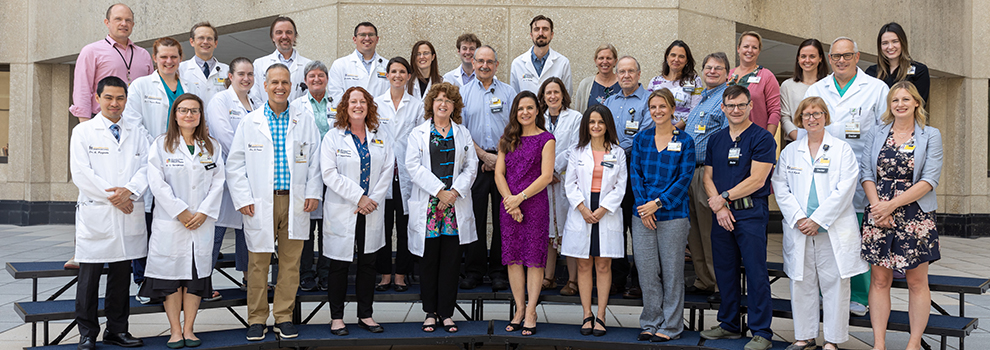
The Department of Psychiatry has a faculty of more than 80 professionals whose clinical, teaching, and research expertise spans the entire discipline.
View a full list of faculty members in the Department of Psychiatry.
Program Coordinator
 Stephanie Wainwright
Stephanie Wainwright
Department of Psychiatry - 8950 JPP
University of Iowa Health Care Medical Center
200 Hawkins Drive
Iowa City, IA 52242
Phone: 319-356-1373
Fax: 319-356-2587
Email: stephanie-wainwright@uiowa.edu
